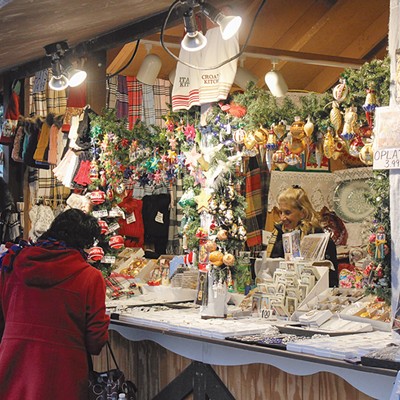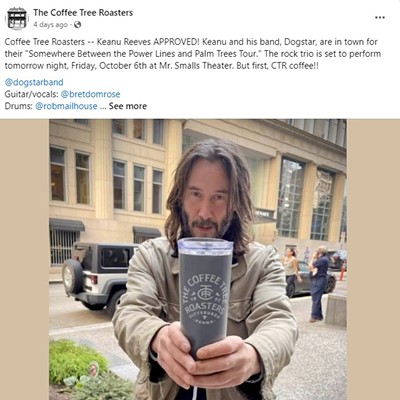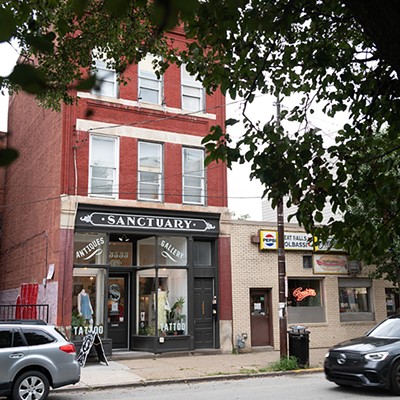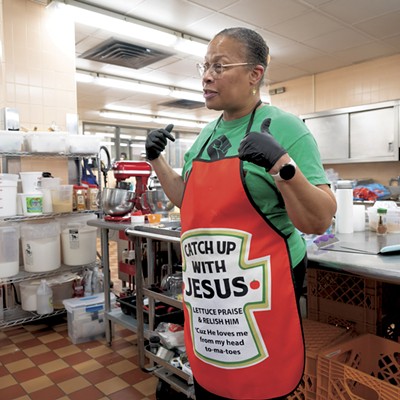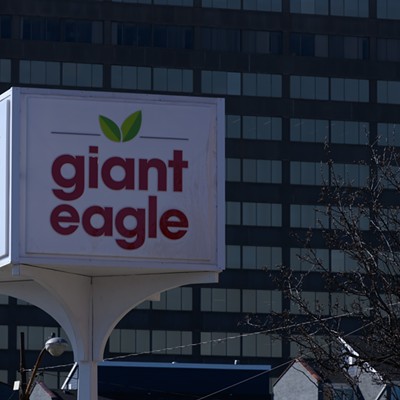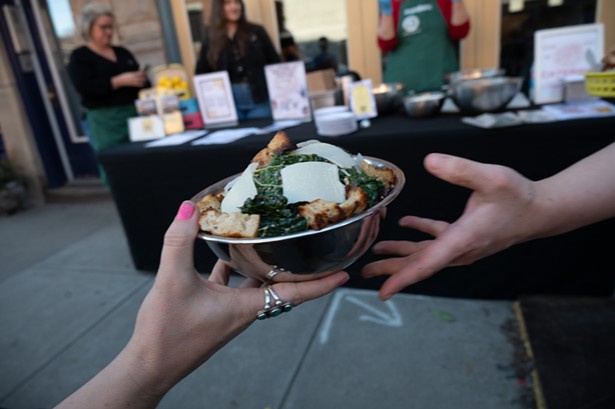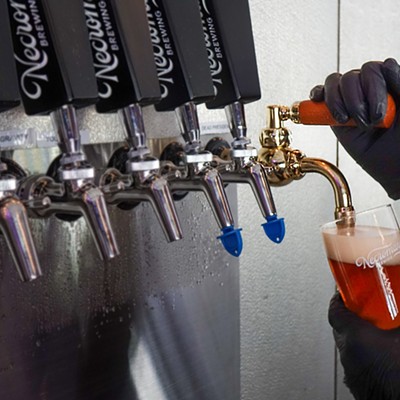Locals call the newly announced Lawrenceville Starbucks location a "betrayal"
Lawrenceville is getting a Starbucks, and not everyone is happy about it.
A LinkedIn announcement late last week confirmed that Milhaus, the Indianapolis-based developer of Lower Lawrenceville's mixed-use development Arsenal 201, had confirmed Starbucks as a tenant in Arsenal 201's corner parcel facing 40th St. On Mar. 5, community organization Lawrenceville United (LU) took to social media to decry the deal as a "direct violation of commitments" Milhaus had previously made to the Lawrenceville community.
"It was very disappointing to hear this news secondhand," LU executive director Dave Breingan tells Pittsburgh City Paper.
He says LU and community members had pushed for Milhaus to maintain the neighborhood's locally owned character — the developer verbally did so during well-attended community meetings held during the planning and construction of the hulking apartment and retail complex. LU has since urged locals to make their voices heard by contacting Milhaus and supporting local unionizing Starbucks workers in their efforts.
"In their own words, they said 'the project team plans on courting local retail and restaurant options and not big box or national chains,'" Breingan says. "There were no written or binding agreements about this, unfortunately."
The voicemail inbox to Milhaus' publicly listed phone number was full when City Paper called, and multiple emailed requests for comment to the developer went unanswered as of press time.
The outcry represents the latest negative response to an out-of-state developer leasing to out-of-state stores and chains during a time of rising rents. In 2021, McCaffery Interests irked many when they courted, then ghosted, Bloomfield-based White Whale Bookstore, bringing in national chain Posman Books instead. Locals see similarities in Milhaus' latest move.
Sarah Walsh, owner of Upper Lawrenceville coffeehouse Caffè d'Amore, tells CP "it's kind of like going on a date with somebody and being like, 'Hey, I said you can kiss me on the cheek,' and then they go for something else."
Walsh says LU and the Lawrenceville Corporation have been indispensable partners for businesses like hers, fostering a Butler St. business landscape that's over 70% locally owned and 30% women-owned. "I can't imagine burning a bridge like that," Walsh says.
Walsh says developers aren't inherently bad — Illinois-based Albion Residential has similar plans for an empty stretch of Butler St. across from Caffè d'Amore — but says it's important that these developers cultivate trust with locals. "We want more people in the neighborhood and more people supporting the businesses in the neighborhood," she tells CP, "but it's all about how you do it."
Milhaus, for one, initially reached out to Walsh and other area business owners but then failed to follow up, she says.
"It would set up the developers in the neighborhood for a much better reception for the businesses that they're leasing to if they listen, and they actually care about what the neighborhood says," Walsh tells CP. She reminds Lawrenceville residents and others to "vote with your dollars" to prevent local businesses from getting muscled out.
Breingan says what the neighborhood needs is not a Starbucks, but groceries.
"An affordable grocery store has long been a priority from the community and was specifically requested in the community process around this particular development," he tells CP. "A use that's accessible and serves our local neighbors would be ideal."
Meanwhile, he's frustrated by the Starbucks lease. "We have always tried to be reasonable," he says, "which is why adding a mega-chain like Starbucks that competes with many of our long-time independent cafés is such a betrayal."
A LinkedIn announcement late last week confirmed that Milhaus, the Indianapolis-based developer of Lower Lawrenceville's mixed-use development Arsenal 201, had confirmed Starbucks as a tenant in Arsenal 201's corner parcel facing 40th St. On Mar. 5, community organization Lawrenceville United (LU) took to social media to decry the deal as a "direct violation of commitments" Milhaus had previously made to the Lawrenceville community.
"It was very disappointing to hear this news secondhand," LU executive director Dave Breingan tells Pittsburgh City Paper.
He says LU and community members had pushed for Milhaus to maintain the neighborhood's locally owned character — the developer verbally did so during well-attended community meetings held during the planning and construction of the hulking apartment and retail complex. LU has since urged locals to make their voices heard by contacting Milhaus and supporting local unionizing Starbucks workers in their efforts.
"In their own words, they said 'the project team plans on courting local retail and restaurant options and not big box or national chains,'" Breingan says. "There were no written or binding agreements about this, unfortunately."
The voicemail inbox to Milhaus' publicly listed phone number was full when City Paper called, and multiple emailed requests for comment to the developer went unanswered as of press time.
The outcry represents the latest negative response to an out-of-state developer leasing to out-of-state stores and chains during a time of rising rents. In 2021, McCaffery Interests irked many when they courted, then ghosted, Bloomfield-based White Whale Bookstore, bringing in national chain Posman Books instead. Locals see similarities in Milhaus' latest move.
Sarah Walsh, owner of Upper Lawrenceville coffeehouse Caffè d'Amore, tells CP "it's kind of like going on a date with somebody and being like, 'Hey, I said you can kiss me on the cheek,' and then they go for something else."
Walsh says LU and the Lawrenceville Corporation have been indispensable partners for businesses like hers, fostering a Butler St. business landscape that's over 70% locally owned and 30% women-owned. "I can't imagine burning a bridge like that," Walsh says.
Walsh says developers aren't inherently bad — Illinois-based Albion Residential has similar plans for an empty stretch of Butler St. across from Caffè d'Amore — but says it's important that these developers cultivate trust with locals. "We want more people in the neighborhood and more people supporting the businesses in the neighborhood," she tells CP, "but it's all about how you do it."
Milhaus, for one, initially reached out to Walsh and other area business owners but then failed to follow up, she says.
"It would set up the developers in the neighborhood for a much better reception for the businesses that they're leasing to if they listen, and they actually care about what the neighborhood says," Walsh tells CP. She reminds Lawrenceville residents and others to "vote with your dollars" to prevent local businesses from getting muscled out.
Breingan says what the neighborhood needs is not a Starbucks, but groceries.
"An affordable grocery store has long been a priority from the community and was specifically requested in the community process around this particular development," he tells CP. "A use that's accessible and serves our local neighbors would be ideal."
Meanwhile, he's frustrated by the Starbucks lease. "We have always tried to be reasonable," he says, "which is why adding a mega-chain like Starbucks that competes with many of our long-time independent cafés is such a betrayal."




